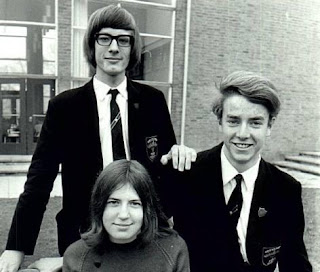Oxford in the early ‘70s was very different to what I imagine it is now. This is the tale of my time in this august institution.
Table of Contents:
Episode 01 - Application.
My headmaster, R.N.Mitchell, BA (Cantab.), asked me if I would consider applying to Oxbridge. I had never heard the term and had to have it explained to me that this was a portmanteau word for Oxford and Cambridge. I also didn’t realise that his degree was not from Canterbury, but in fact Cantabrigiensis, the Latin for Cambridge. This explains his keenness for somebody from Kenilworth Grammar School to go to one of these hallowed institutions.
At this point, I need to digress to explain the English education system as it was in the 1960s in Warwickshire.
You attended junior school from the ages of 5 to 11. In your final year you sat the 11+ exam and this academic triage affected the rest of your life. If you were less academically gifted you went to a secondary modern school where the syllabus was more vocational. If you were brighter you went to the local grammar school for a broader education. If you were one of the very brightest you went to the local public school. The thought that the whole of your future life could be determined by one single test on one day at age 11 was a terrible idea. This system turned out to be a bad idea for people who were late developers and for many other reasons.
For non UK readers I need to explain that a public school is exactly the opposite of what its name suggests. It is a fee paying school predominantly populated by the children of the upper classes and the wealthy. A few of the brightest state pupils had their places paid for as a result of the 11+.
At your senior school, you studied from 11 to 16, and sat your O-level exams (O = Ordinary), normally eight subjects. Some left school after O-levels, others went onto the sixth form typically to study three A-levels (A = Advanced). These took two years. In the second year sixth (aka Upper 6th) you would apply to multiple universities and get offered places conditional upon achieving certain grades in your A-levels. These required grades were determined by a combination of supply and demand and the rigour of the degree e.g. mining engineering only required two passes at E grade; medical school typically required two A’s and a B.
Entrance to Oxford and Cambridge, however, was achieved by sitting their own unique entrance exam which was taken in the spring following your A-levels. This meant staying on for a third year sixth form which is something that only public schools could afford. Grammar school pupils had already headed off to university. As a result, the Oxford and Cambridge student intake was drawn predominantly from the offspring of the upper and moneyed classes.
The Oxford colleges published an annual Norrington table, which ranked the 30 or so colleges based on their degree results. Some of the colleges in the lower echelons of this league table realised that they were missing out on potentially very capable students from other schools because of the selection process described above. Therefore Hertford introduced the Tanner scheme whereby they would offer places to pupils based on an interview, recommendation from the school and predicted grades.
I was a beneficiary of this scheme. I had an interview with Professor Keith McLauchlan, and was offered a place conditional on getting “Use of English” and, bizarrely, just two A-levels of unspecified pass grade, because this was the minimum to be eligible for a grant from the local educational authority. As it turned out I was, as the Americans say, a straight A student and achieved three A grades in my A-levels.
Text of letter:
FROM THE PRINCIPAL
HERTFORD COLLEGE
OXFORD 0X1 3BW
TEL. OXFORD 41434
16 December 1970Dear Mr. McLellan,
I am pleased to be able to offer you a place as a Commoner in this College, subject to your satisfying Matriculation requirements*, for Michaelmas Term 1971, to read Chemistry.
Will you please let me know by return, if possible, that you wish to accept this offer, and complete and return to the Admissions Office the enclosed slip so that the UCCA machinery can be made to work.
Information about reading before you come up can be obtained from Dr. McLauchlan. and you will be informed of administrative arrangements by the College Secretary later on.
Yours sincerely,
(Sir Lindor Brown)*to qualify for Matriculation you need to gain the following G.C.E. passes: Use of English; 2 A levels.
Mr. M.S. McLellan.
Two other pupils from my year also were successful in their applications to Cambridge and, it being a slow week, us three star pupils warranted an item in the local newspaper, the Kenilworth Weekly News.
Text of article:
Knowledge is rewarded
Three pupils of Kenilworth Grammar School, all in the Second Year Sixth, have been successful in gaining entrance to Oxford and Cambridge colleges. Mark McLellan (at the back), of 7 Barford Road, Kenilworth, is to read chemistry at Hertford College, Oxford. Daphne Kane, 14 Lancaster Place, Kenilworth, will be going to Girton College, Cambridge next October to read modern and mediaeval languages (French and Latin). Churchill College, Cambridge, in October 1972, is where Nigel Bull, of Eastern Green is due to read modern languages (German and Russian) after under taking a year's voluntary service.
Bizarre that they would publish our home addresses but those were more innocent times.
No gap year for me, it was next stop Oxford...
Next: 02 Social - not the happiest of times.





No comments:
Post a Comment